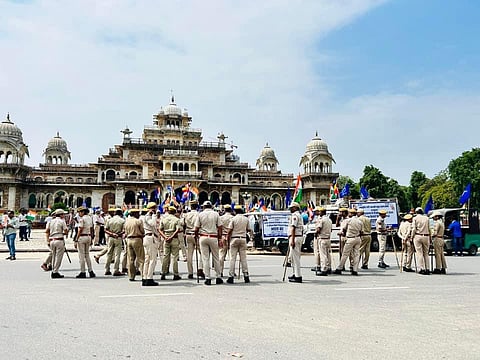
Jaipur – On Wednesday, August 21, the Bharat Bandh in Rajasthan had a noticeable impact across various districts, particularly in Jaipur, Alwar, Sikar, Karauli, Bharatpur, and Bhilwara. Shops remained closed, public transport and buses were halted, processions were held, and in some places, violent clashes occurred.
However, on this day, several Dalit communities undertook special activities in protest against the Bharat Bandh and clarified their stance in support of the Supreme Court's sub-quota decision.
The SC/ST Sangharsh Samiti, along with other caste groups, organized Sadbuddhi Yajnas and Ramdhuni to express support for the Supreme Court's decision, believing it to be correct. Learn about the steps these Dalit communities took during the bandh and why they consider the Supreme Court’s ruling to be justified. The bandh had an effect in key areas but did not receive widespread support from all sections of society.
On this day, the SC/ST Sangharh Samiti Rajasthan and various caste communities organized special activities to oppose the bandh. Members from over 30 castes, including Valmiki, Nat, Bawari, Kalbeliya, Kanjar, Dhanaka, and Saperas, performed Sadbuddhi Yajnas and Ramdhuni in front of a portrait of Dr. B.R. Ambedkar, the architect of the Constitution. The purpose of these events was to pray for wisdom for those opposing the Supreme Court’s recent decision and to appeal to the governments to implement the Court’s ruling.
Rakesh Bidawat, the state convenor of the committee, reported that in the Kalbeliya settlement of Vidyadhar Nagar, members of the Sansi and Bawari communities participated in the Yajna. In the Valmiki settlement of Brahmpuri, Ramdhuni was performed, and prayers were offered to the deity to grant wisdom to those questioning the Supreme Court's decision and to give governments the courage to enforce the ruling.
After the Yajna and Ramdhuni, various representatives including Advocate Ramdhan Sansi, Advocate Mahendra Singh Chauhan from the Valmiki community, Sitaram Lugaria from the Dhanaka community, Madan Lal Rajwanshi, President of the Nat community, Ghanshyam Gwariya, Dinesh Sapera, Kashiram Sansi, Kanaram, Narendra, and others from thirty communities issued a joint statement. They noted that since the Constitution was enacted, the deprived and oppressed classes have not benefited from reservation. They urged the governments to provide reservation benefits to lower classes and integrate them into the mainstream.
Meanwhile, BJP senior leader Kirori Lal Meena supported the Supreme Court's decision on creamy layer, emphasizing that it should be respected and implemented.
He cited examples from his own village, noting that while he and his brother achieved high positions (Doctor and IAS-RAS respectively), their neighbors continue with traditional work, demonstrating the necessity of the Supreme Court's decision.
Meena also accused the Bharat Bandh organizers of pursuing political gains and alleged that Congress aimed to incite violence. He suggested that those who are deprived of reservation should also benefit from it.
Thus, the Bharat Bandh on August 21 had an impact in several districts of Rajasthan, but the opposition from various communities and the Sadbuddhi Yajna presented a new perspective on the issue. The day's events have introduced a new dimension to Rajasthan's social and political landscape, with different communities voicing their concerns and demanding the implementation of the apex court's decision.
You can also join our WhatsApp group to get premium and selected news of The Mooknayak on WhatsApp. Click here to join the WhatsApp group.